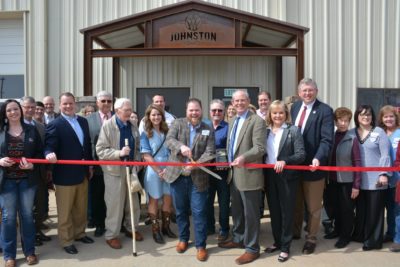In an era when large corporate firms dominate the seed business, Johnston Seed Co. — the oldest and largest independently owned seed supplier in Oklahoma — takes pride in being family run, service oriented and community minded.
On March 9, the company celebrated 125 years in business — it’s 14 years older than the state itself — with a ribbon cutting and open house at the remodeled headquarters at 319 W. Chestnut in Enid, which include a new 3,000-square-foot retail store, a tripling of on-site warehouse space and new cleaning and processing equipment. Company representatives and vendors will showcase top-of-the-line products, including a distinguished portfolio of turf and forage grasses considered among the best in the world, developed, tested and grown in-house.
The entrepreneurial spirit driving the company is part of a legacy that goes back to its early roots in the Cherokee Strip Outlet, according to president and CEO Joey Meibergen, the fifth generation to run the family business.
Meibergen said the company continues to draw inspiration from the risk-taking and forward-thinking of founder Willis B. Johnston, who went to Kansas City in 1893, shortly after the Cherokee Strip Land Run, and brought back a rail car filled with seed and supplies so the pioneers could plant their first crop.
“He loaned seed to those settlers so they would have something to plant to help them get established,” he said. “When the settlers harvested the crop, they would pay back two times the amount of seed they borrowed, and that’s how it all got started.”
The anniversary celebration coincides with a company-wide rebranding campaign, which includes a new logo and a user-friendly website.
“We’ve really refined that and added a product search tool and sorting function so customers can find what they need quickly,” he said. “They can also take their time and look through all of the products we have online. Our resource pages have been really popular, so we plan to expand those and add more video content.”
Markets near and far
Johnston Seed products are sold through a network of 300 dealers and distributors, and shipped overseas to Japan, South Korea, Brazil and other markets worldwide.
At the same time, the company’s new retail store is intended to be an alternative to big box retailers for area customers who want better products and service while keeping their dollars in the local community.
“We’re becoming known as the place where you go to get the good stuff,” Meibergen said. “Lowe’s, Walmart, Home Depot, the big box chains, they take absolutely the cheapest thing they can buy and put it in a bag with a fancy name on it, and customers leave those stores lacking the expertise to be successful.
“What makes us unique and sets us apart is that we trial nearly everything we sell,” he added. “In fact, a lot of the stuff we sell is grown at our own production farms at Fort Cobb, Aline, Wakita and Enid. We’ve got a great production crew that puts in a lot of hours to ensure the quality is respective and worthy of our name.”
The company grows around 35 different plant species on 20 irrigated circles (around 3,300 acres) and employs roughly 40 people who, taken together, represent hundreds of years of experience in the agricultural field, Meibergen said.
Their average tenure is 10 years, which is twice the national average.
Within the company, the crown jewel is its warm season forage and turfgrass breeding and marketing program, which includes work on switchgrass, ryegrass, buffalo grass and, most importantly, forage and turf-style Bermudagrasses.
“We have a big footprint in the Bermudagrass market, which a lot of people don’t know about,” said Roger Goodwin, the company’s director of sales. “Farmers tend to think of us as a source of corn and soybean seed, but they don’t realize the research and development that’s gone into our Bermudagrass breeding program for the last 20 years. But they are starting to hear about it now, which is very exciting.”
David Gerken adds, “Very few private companies do their own research and development like we do.” Gerken joined the company after working for more than 20 years in the turfgrass industry. “The products we sell are considered the best of the best.”
It all started as part of a collaboration with Oklahoma State University to introduce the first proprietary seeded Bermudagrass, Guymon, back in 1982. Compared to common Bermudagrass, this improved variety was more winter hardy and helped to expand the geographical area where it could be grown successfully.
Several other leading varieties followed.
“Wrangler (a forage type) and Riviera (a turfgrass) have been the top Bermudagrasses in the world for the last 18 years running,” Meibergen said. “They’ve been phenomenal, and nobody’s been able to beat them. They’ve performed so well that it’s been difficult to develop anything better.”
When OSU’s highly regarded Bermudagrass breeder, Charles Taliaferro, retired from the university in the mid-2000s, Johnston Seed hired him to continue his breeding and research.
As a result of his ongoing work, this spring the company is introducing a new seeded Bermudagrass for the turf industry, Monaco, and is in the final stages of patenting two new vegetatively seeded turf varieties. The company also sells sod and licenses its grass genetics to other sod farms around the country, Meibergen said.
Another important niche for Johnston Seed is native grasses and wildflowers such as Texas bluebonnets, which are collected from natural settings and increased in the company’s fields to sell as components in conservation, pollination and decorative mixes. Johnston Seed grows about a dozen different mix components, such as partridge peas, purple prairie clover, purple coneflower and Maximilian sunflower, and also buys in components that don’t grow as well in Oklahoma.
While Johnston Seed can source and distribute almost any seed imaginable, some of their hottest products right now are specialty forages and plant mixes used as cover crops.
Goodwin, the sales director, who has been with the company for just over 10 years, described Oklahoma as a little late to the game on cover crops but rapidly catching up.
“Higher rainfall does make a big difference on the success of cover crops,” he said. “If I plant a cover crop, will it dry out my ground? That’s a concern we hear across our trade area. We try to explain that a lot of times they will be better off to have something green and growing, and they will be surprised by the moisture they’ll have out there. With something shading the ground and keeping it cooler, you don’t have as much evaporation.”
Making selections about which plant species to grow, how to combine them and timing of rotations is something the sales team of six can help with, he added.
“We see ourselves as consultants, not just seed salesmen,” Goodwin said. “We can take someone all the way through the process with their operation and answer any questions along the way. When you have people on staff with 30 and even 40-plus years of experience, that goes a long way toward helping ensure success.”
Some of Johnston Seed’s most popular products are specialty grasses, which can be used in cover crop mixes or grown alone for hay and forage. They include Tiffany teff grass, a quick growing warm season annual with excellent hay and forage quality; Red River crabgrass, another annual that makes lush and palatable summer pasture; and brown mid-rid or low lignin sorghum sudangrasses and forage sorghums, which are highly digestible and productive, typically providing multiple cuttings.
One challenge Goodwin sees affecting the seed business is herbicide resistant weeds, especially Palmer amaranth, often referred to as pigweed.
“Seed tests are becoming very important,” he said.
Contamination drives up cleaning costs, and sometimes multiple cleanings are required, he said.
It’s a reminder farmers, homeowners, landscapers and conservationists ultimately get what they pay for and have an incentive to seek out experienced seed providers with a reputation for producing and selling quality products.
In Oklahoma, the Johnston name has long been synonymous with grain origination, marketing and agronomy services, which sometimes overshadowed the seed side of the business. For most of its history, Johnston Enterprises operated multiple country elevators, a grain terminal in Enid and a port facility near Inola.
Two years ago, the grain business was sold to CGB Enterprises Inc. Since then, the business has re-focused on its role in seed development and distribution.
Goodwin said he enjoys being part of a business that is locally owned and operated and dedicated to the success of rural Oklahoma and the surrounding region.
“That’s what makes it fun,” he said. “Family is very important to this company. You do get treated like family here.”
Story provided by Enid News & Eagle
Written by: Candace Krebs


